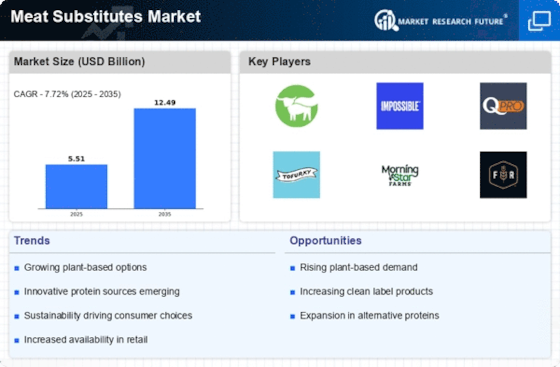Top Industry Leaders in the Meat Substitutes Market

The competitive landscape of the meat substitutes market is marked by intense rivalry and a growing number of players aiming to capitalize on the burgeoning demand for plant-based protein alternatives. The market has witnessed a surge in consumer interest driven by health consciousness, environmental concerns, and ethical considerations.
Key players in this domain include.
- Beyond Meat
- AMY's Kitchen Inc.
- Garden Protein International Inc.
- Quorn Foods Inc
- MorningStar Farms L.C.
- Schouten Europe B.V.
- Sunfed Ltd
- VBites Foods Ltd.
- Blue Chip Group, among others
Strategies Adopted:
Beyond Meat and Impossible Foods have focused on product innovation, introducing plant-based alternatives that closely mimic the taste and texture of traditional meat products. This strategy has resonated well with consumers seeking a seamless transition to meat substitutes without compromising on sensory experiences. Quorn, on the other hand, has leveraged its fungal-based protein technology to create a diverse product portfolio, catering to different consumer preferences.
Nestlé and Tyson Foods, as established players in the food industry, have pursued a combination of in-house development and strategic partnerships. Nestlé has expanded its plant-based offerings through the acquisition of companies like Sweet Earth and Atrium Innovations, demonstrating a commitment to diversifying its product portfolio. Tyson Foods, a traditional meat producer, has strategically invested in alternative protein companies, recognizing the shifting consumer preferences.
Market Share Analysis Factors:
Market share analysis in the meat substitutes sector is influenced by several factors. Product quality, pricing strategies, distribution networks, and brand reputation play crucial roles in determining the market share of each player. Beyond Meat, with its early market entry and strong brand presence, has secured a significant share, while Impossible Foods has gained traction through partnerships with major fast-food chains like Burger King. Quorn's focus on providing a variety of meat alternatives has enabled it to capture a niche market segment.
In assessing market share, the geographical presence of companies is also a pivotal factor. Localized preferences and cultural considerations impact consumer choices, and companies adept at tailoring their products to regional tastes tend to fare well. Nestlé, with its global reach and distribution channels, has successfully penetrated diverse markets, contributing to its market share growth.
New & Emerging Companies:
The meat substitutes market has witnessed the emergence of new and dynamic entrants seeking to disrupt the existing order. These companies, often leveraging novel technologies and sustainable sourcing practices, pose a potential challenge to established players. Notable newcomers include Oatly, a Swedish company known for its oat-based products, and Sunfed, a New Zealand-based firm specializing in plant-based meats. These companies have rapidly gained attention for their unique approaches to plant-based protein production.
Industry Trends:
Industry news and current company investment trends shed light on the dynamic nature of the meat substitutes market. Investments in research and development, production facilities, and marketing initiatives are common trends among key players. Additionally, strategic partnerships, collaborations, and joint ventures are prevalent, as companies seek to leverage each other's strengths and capitalize on synergies. In 2023, Beyond Meat announced a strategic partnership with PepsiCo, aiming to expand its product reach through increased distribution and marketing efforts.
Competitive Scenario:
Overall, the competitive scenario in the meat substitutes market remains vibrant, with companies continuously adapting to changing consumer preferences and market dynamics. The landscape is characterized by a mix of traditional food industry giants and nimble, innovative startups, creating a diverse and competitive environment. As consumer awareness of health and sustainability issues continues to grow, companies are expected to intensify their efforts to differentiate themselves and capture a larger market share.
Recent Development
A notable recent development in 2023 was the increased focus on technological advancements in plant-based protein production. Companies invested in refining their production processes, enhancing the taste and texture of their products, and exploring alternative protein sources. This drive towards innovation underscores the industry's commitment to meeting consumer expectations and ensuring the long-term viability of meat substitutes as a mainstream food choice.











